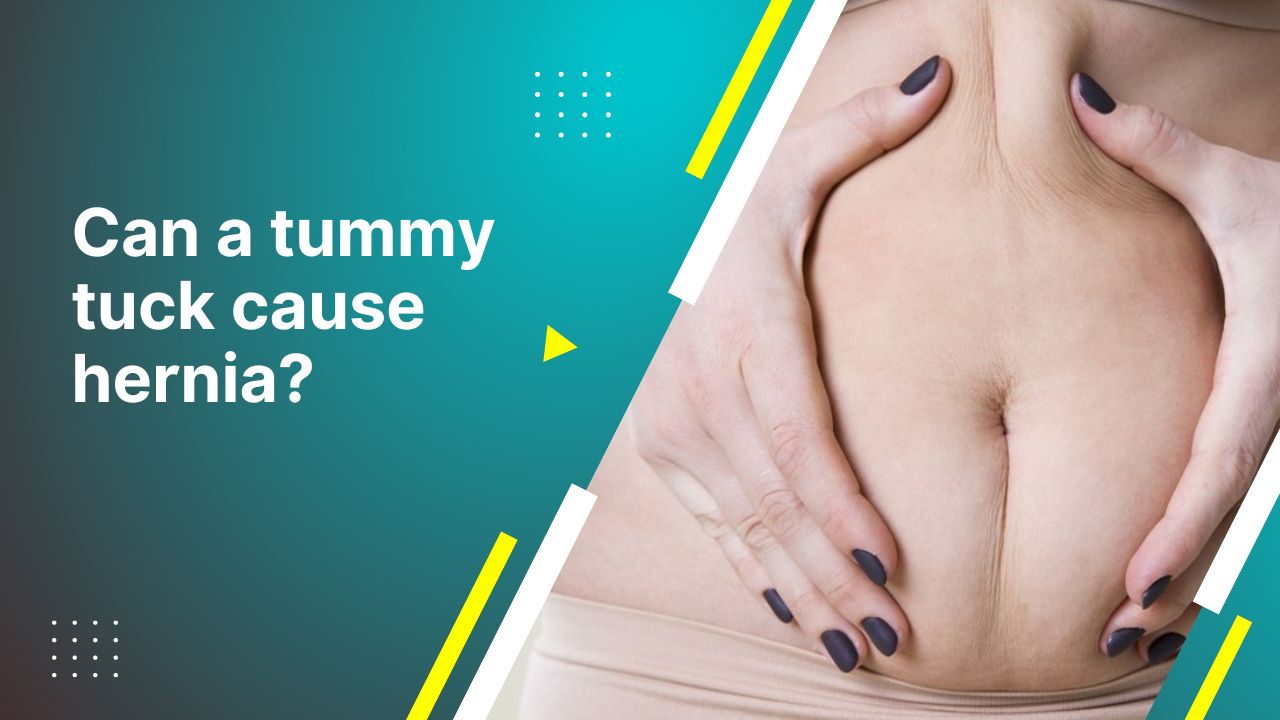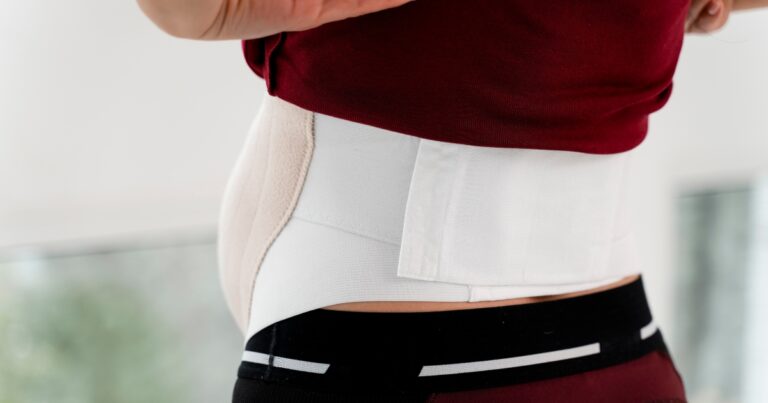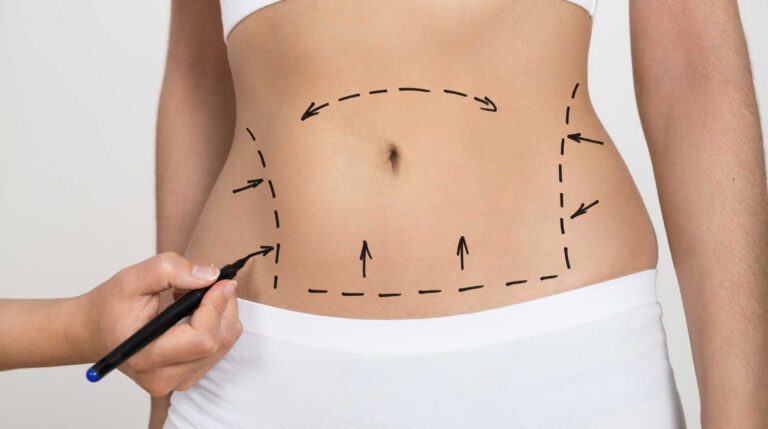A tummy tuck could cause an incisional hernia. A hernia occurs when an organ or tissue bulges through an abnormal opening. Symptoms can be bulging, swelling, pain, or none at all. A hernia could be present before a tummy tuck and revealed when the fat and skin reduce.
An incisional hernia happens when the muscles held together by sutures weaken. Several factors could weaken the sutured muscles after a tummy tuck. These factors include strenuous or premature exercise, pregnancies, and significant weight gain.
People also ask what can go wrong after a tummy tuck. What are the warning signs of a hernia? This article looks to answer these questions and more.
Keep reading to learn about the link between abdominoplasty and hernias.
Book A Consultation With Dr Tarek Bayazid
Top-rated Plastic Surgeon For Tummy Tuck in Dubai
Installment Plan Available
Can tummy tuck cause a Hiatal hernia?
Abdominoplasty cannot cause a hiatal hernia. A hiatal hernia occurs when the upper part of your stomach bulges through the diaphragm. It usually has no visible symptoms and can be mistaken for regular heartburn. Patients also see a doctor thinking they have regular acid refluxes.
Having a larger hiatus than usual causes this hernia. A hiatus is the opening in the diaphragm where the esophagus passes through. Other causes include pressure in the abdominal cavity and diaphragm weakening with age.
What are the warning signs of a hernia?
Some symptoms should concern you once you notice them. They may show a possible hernia, and you should visit a doctor for screening. These symptoms include
- Pain in the abdomen or groin when lifting or coughing.
- A bulge in the suspected area that reduces in size when lying down.
- Feeling full often.
- Obstruction in your bowel movement.
- Nausea, vomiting, or both.
- Pressure in your groin.
Can you fix a hernia caused by a tummy tuck?
A hernia brought on by a tummy tuck is fixable. Your surgeon will make an incision at the abdominal muscle and try to push back the hernia. Afterward, they will resuture the incision to ensure it stays in place.
To prevent weakening in the future, the surgeon will have to address the reason for the weakening. They might suggest liposuction to reduce strain on the abdomen if it is weight gain.
Can a hernia after a tummy tuck cause stomach issues?
A hernia after a tummy tuck surgery can cause stomach issues. A tummy tuck revision can correct these problems. Some of them may be
- Obstruction of the bowel. An incisional hernia in the abdomen could mean part of the intestines pushing through the abdominal muscles. This part of the intestine cannot efficiently pass through food and water. The patient is now unable to have regular bowel movements. Obstructions are painful and, if left untreated, are fatal.
- Nausea and vomiting. Whenever the contents in the hernia become trapped, your body will try to eject them. It will do that by causing you to feel nauseous and vomit. Regular vomiting will leave you dehydrated, tired, and uncomfortable.
- Pain or discomfort. An incisional hernia could grow with time because the muscle continues to weaken. Pain is typically felt as your muscles stretch and tear.
- Strangulation. The organ that pushes through the weak muscles has reduced blood supply. As a result, it receives less oxygen than usual. Over time, the affected tissue begins to die. It is fatal if left untreated because there is no way to revive dead tissue.
Selecting a highly experienced and reputable surgeon will significantly minimize these problems. Dr. Tarek is one of Dubai’s premier plastic surgeons known for his exemplary work, especially in facial rejuvenation and body contouring.
Can a hernia after a tummy tuck fix itself?
Hernias don’t go away on their own, but they typically aren’t life-threatening. Surgery is the only way to treat them. A truss only eases the symptoms temporarily. A truss is an undergarment that holds a hernia in place.
Some hernias retract when you’re relaxed, but that doesn’t mean they’re fixed. They bulge back out whenever you’re not relaxed.
Conclusion
Hernia is a problem you don’t have to live with. Surgery exists to fix hernias and give you the results you wanted from your tummy tuck. The risks of hernia are reduced when you select a skilled surgeon like Dr. Tarek. Do not ignore the warning signs explained in this article because the earlier hernias are detected, the better.
At Dr. Tarek Aesthetics, we have vast experience in abdominoplasty. To get an idea of our work, visit our tummy tuck gallery to see how we have helped patients. The results of a tummy tuck are permanent, and your ideal body is just a call away. The cost of the tummy tuck will be laid out for you in-depth during consultation.
Book a consult for a tummy tuck with Dr. Tarek Bayazid. Member of the most prestigious Plastic Surgery Societies worldwide: American Society of Plastic Surgeons (ASPS), the International Society of Aesthetic Plastic Surgery (ISAPS), the Emirates Plastic Surgery Society (EPSS), and Melbourne Advanced Facial Anatomy Course (MAFAC).
Frequently asked questions
How long can you live with a hernia in your stomach?
The symptoms of a hernia may be negligible in the beginning. Some hernias can stay small for months or years. Some grow in size and cause complications such as bowel obstruction and strangulation. These complications are fatal. It isn’t advisable to leave hernias untreated.
What are the types of hernias that a tummy tuck can cause?
- An incisional hernia is when organs or tissue push through sutures at an incision site. They are common after surgical procedures.
- An umbilical hernia is when organs pass through the abdominal muscles near the navel. It is common among infants and toddlers.
- An inguinal hernia is when the intestines push into the inguinal canal. This canal is the passageway on either side of your pelvis into your reproductive organs. It commonly occurs in men.
Can you get a hernia from stomach surgery?
Getting an internal hernia after stomach surgery (gastric bypass) is possible. It is a major surgery where a surgeon isolates part of the stomach from the whole. This part is then directly connected to the small intestine. If the abdominal walls weaken during the bypass, organs may push through it.








